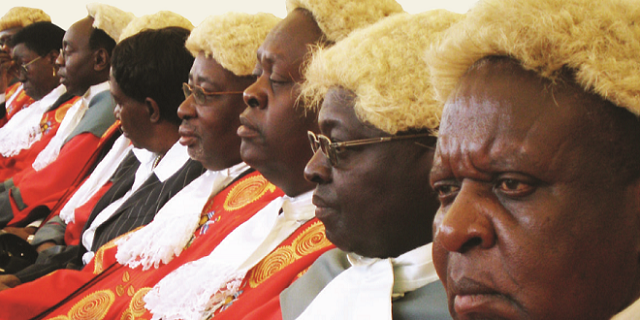
Justice Kanyeihamba warns of looming vacuum in judiciary
Chief Justice Bart Katureebe will be 70-years old in 2020 and, under current law, he must retire then. That is four years away but already anxiety is mounting about who will replace him. Part of the reason for the anxiety is that the Deputy Chief Justice, Steven Kavuma, who would be an almost natural replacement is also due to retire in 2017. And it gets even more complicated because another five top judges are due to retire between now and end of next year.
First in retiring line is Justice Augustine Nshimye who is set to retire next month. Nshimye’s retirement is significant because he was on the Coram of nine hearing the election petition challenging President Yoweri Museveni’s re-election in February by former presidential candidate John Patrick Amama Mbabazi. Also on the panel was Justice Jotham Tumwesigye who is set to retire in August 2017.
The departure of justices Katureebe, Tumwesigye, and Nsimye means that if there is an election petition in 2021, as has been the case since 2006, it will either be heard by a panel smaller than the nine who heard the 2016 petition or it will have at least three new justices of the Supreme Court. Question is who will they be?
This question, according to former Supreme Court judge Prof. George William Kanyeihamba, must be giving President Museveni sleepless nights.
Kanyeihamba told The Independent in an interview on Oct.27 that the biggest importance of Supreme Court justices to President Museveni and the NRM is that “they are instrumental in validating a presidential election in case a presidential election petition is filed”.
He was referring to a provision in the Constitution that whereas the Supreme Court, as the top court in Uganda, is generally an appellant court hearing appeals from cases in the Court of Appeal/Constitutional Court, in the case of Presidential Election petitions, it is the only court with powers to hear them.
To Kanyeihamba, that is what happened before in 2006 where he was one of the justices on the panel with former Chief Justice Benjamin Odoki which validated an election marred by irregularities.
He added that some of the justices currently on the bench have been investigated and found to be corrupt. He revealed that he was previously tasked to carry out an investigation into the judiciary but even before his report was published, individuals being investigated had been promoted to the two top most courts; the Court of Appeal and Supreme Court.
Searching for cadre judges
Kanyeihamba says that apart from validating an election, “Museveni needs a loyal judiciary more now considering the increasing misdeeds; including torture, disrespect for the law and corruption as more and more people are getting tired of the regime as he stays longer in power”.
Kanyeihamba says Museveni, therefore, has been looking for judges who would make decisions that are favourable to his government, otherwise known as “NRM cadre judges”. He said some of the retiring judges are “NRM party cadres” and Museveni would want to replace them with similar stock.
Justice Kavuma is the most often cited cadre judge based on his role in some controversial court rulings against opposition politicians. He was criticised by political opposition supporters for ordering the Kasangati Magistrates’ Court from ruling on whether Museveni’s strongest challenger, Dr. Kizza Besigye’s now routine confinement at his home by the police is illegal. Kavuma also declared the Forum for Democratic Change (FDC) party campaign of defiance, led by Besigye, to be illegal. Besigye petitioned the Judicial Service Commission, as an institution charged with handling judicial official’s misconduct, complaining about what he said was Justice Kavuma’s lack of independence and continuous pursuit of fulfilling Museveni’s wishes through legal means.
Article 142 of the Constitution provides for who appoints justices, how they are appointed, how they should be promoted, how they are disciplined, and how they are terminated if ever. The procedures are so elaborate that, according to Makerere University Law Don Kakungulu Mayambala the obvious expectation is that any justice would be impartial the moment they are appointed and serving both the NRM and the opposition fairly and without fear or favour.
Instead, Mayambala says, because Museveni reserves powers to appoint, he gets those who buy into his ideology and in some cases those he knows are not bold enough to stand to their principals in circumstances where their appointing authority is involved.
“The judiciary needs a justice of the caliber of Kanyeihamba who served in government but remained independent and didn’t succumb to the pressures of the executive,” he says, “the legal fraternity is not short of such individuals.”
Kanyeihamba and Mayambala are not the first people to allege that President Museveni seems determined to gain full control of the judiciary through \appointing cadre judges.
 The Independent Uganda: You get the Truth we Pay the Price
The Independent Uganda: You get the Truth we Pay the Price



